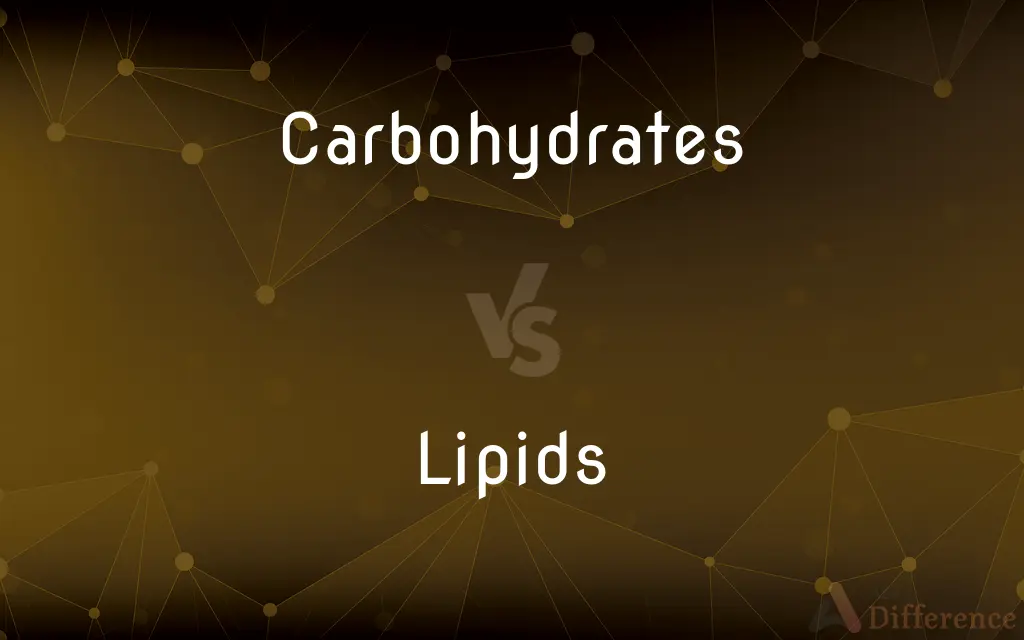Carbohydrates vs. Lipids — What's the Difference?
By Tayyaba Rehman — Published on October 16, 2023
Carbohydrates are organic molecules primarily used for energy, consisting of carbon, hydrogen, and oxygen, while lipids are hydrophobic organic molecules, including fats and oils, that store energy and are essential for cellular functions.

Difference Between Carbohydrates and Lipids
Table of Contents
ADVERTISEMENT
Key Differences
Carbohydrates and lipids are both vital macromolecules for organisms, with carbohydrates primarily serving as a quick energy source. In contrast, lipids act as long-term energy storage and are crucial for various cellular structures and functions.
Structurally, carbohydrates are made of monosaccharides, which can be combined in various ways to form complex carbohydrates. Lipids, on the other hand, can range from triglycerides to phospholipids and steroids, each with unique structures and functions.
When it comes to solubility, carbohydrates are generally soluble in water due to their hydrophilic nature. Lipids, conversely, are hydrophobic, making them insoluble in water but soluble in nonpolar solvents.
In terms of dietary sources, carbohydrates are abundant in foods like grains, fruits, and vegetables. Lipids are commonly found in oils, butter, and meats, providing more than twice the caloric energy per gram than carbohydrates.
Both carbohydrates and lipids play essential roles beyond energy. Carbohydrates can be structural, like cellulose in plants, while lipids form cellular membranes and serve as signaling molecules.
ADVERTISEMENT
Comparison Chart
Basic Function
Primarily energy source
Energy storage, cellular structure, and signaling
Structural Units
Made of monosaccharides
Triglycerides, phospholipids, steroids
Solubility
Generally water-soluble
Insoluble in water, soluble in nonpolar solvents
Dietary Sources
Grains, fruits, vegetables
Oils, butter, meats
Energy Content
Provides around 4 calories/gram
Provides around 9 calories/gram
Compare with Definitions
Carbohydrates
Carbohydrates include sugars, starches, and fibers found in fruits, grains, and dairy products.
Bread is a food rich in carbohydrates.
Lipids
Lipids are diverse hydrophobic organic molecules, including fats, oils, and phospholipids.
Olive oil consists primarily of lipids.
Carbohydrates
Carbohydrates can influence blood sugar levels, affecting energy and mood.
Consuming too many refined carbohydrates can lead to energy crashes.
Lipids
Lipids can be saturated or unsaturated based on the type of bonds between carbon atoms.
Butter contains more saturated lipids than vegetable oils.
Carbohydrates
Carbohydrates can be categorized as simple or complex, based on their chemical structure.
Fructose in fruits is a simple carbohydrate.
Lipids
Lipids are essential for energy storage, insulation, and cellular structure.
The cell membrane comprises lipids, forming a protective barrier.
Carbohydrates
Carbohydrates are organic compounds comprising carbon, hydrogen, and oxygen, primarily serving as energy sources.
Glucose, a simple carbohydrate, provides quick energy to cells.
Lipids
Lipids are energy-dense molecules, providing more calories per gram than proteins or carbohydrates.
Nuts, rich in lipids, are a high-calorie snack.
Carbohydrates
Carbohydrates play vital roles in various biological processes beyond energy provision.
Cellulose, a carbohydrate, provides structural support to plants.
Lipids
Lipids play crucial roles in hormone production and signaling in organisms.
Cholesterol, a lipid, is a precursor for several hormones.
Carbohydrates
Any of a group of organic compounds, including sugars, starches, celluloses, and gums, that contain only carbon, hydrogen, and oxygen and that originate chiefly as products of photosynthesis. Carbohydrates serve as a major energy source for living things.
Lipids
Any of a group of organic compounds, including the fats, oils, waxes, sterols, and triglycerides, that are insoluble in water but soluble in nonpolar organic solvents, are oily to the touch, and together with carbohydrates and proteins constitute the principal structural material of living cells.
Carbohydrates
A food, such as bread, rice, or potatoes, that is composed largely of these substances.
Lipids
Plural of lipid
Carbohydrates
Plural of carbohydrate
Common Curiosities
Do lipids dissolve in water?
No, lipids are hydrophobic and do not dissolve in water.
Are all carbohydrates sugary?
No, while some carbohydrates are sugars, others are starches or fibers.
Are both carbohydrates and lipids sources of energy?
Yes, carbohydrates are a primary energy source, while lipids are used for long-term energy storage.
Can lipids be found in cell membranes?
Yes, lipids, especially phospholipids, are vital components of cell membranes.
Are carbohydrates essential for brain function?
Yes, the brain primarily uses glucose, a carbohydrate, as its energy source.
Which provides more energy, carbohydrates or lipids?
Lipids provide more energy per gram than carbohydrates.
Can excessive carbohydrate consumption be harmful?
Yes, excessive intake, especially of refined carbohydrates, can have negative health effects.
Can lipids act as signaling molecules?
Yes, certain lipids, like steroids, play roles in cellular signaling.
What's a common type of lipid in our diet?
Triglycerides, found in fats and oils, are a common dietary lipid.
Are cholesterol and fatty acids types of lipids?
Yes, both cholesterol and fatty acids are categorized as lipids.
Why are fibers, a type of carbohydrate, important for digestion?
Fibers add bulk to stools and aid in digestion, even though they aren't digested themselves.
Share Your Discovery

Previous Comparison
Language Acquisition vs. Language Learning
Next Comparison
Maple vs. Cherry WoodAuthor Spotlight
Written by
Tayyaba RehmanTayyaba Rehman is a distinguished writer, currently serving as a primary contributor to askdifference.com. As a researcher in semantics and etymology, Tayyaba's passion for the complexity of languages and their distinctions has found a perfect home on the platform. Tayyaba delves into the intricacies of language, distinguishing between commonly confused words and phrases, thereby providing clarity for readers worldwide.
















































